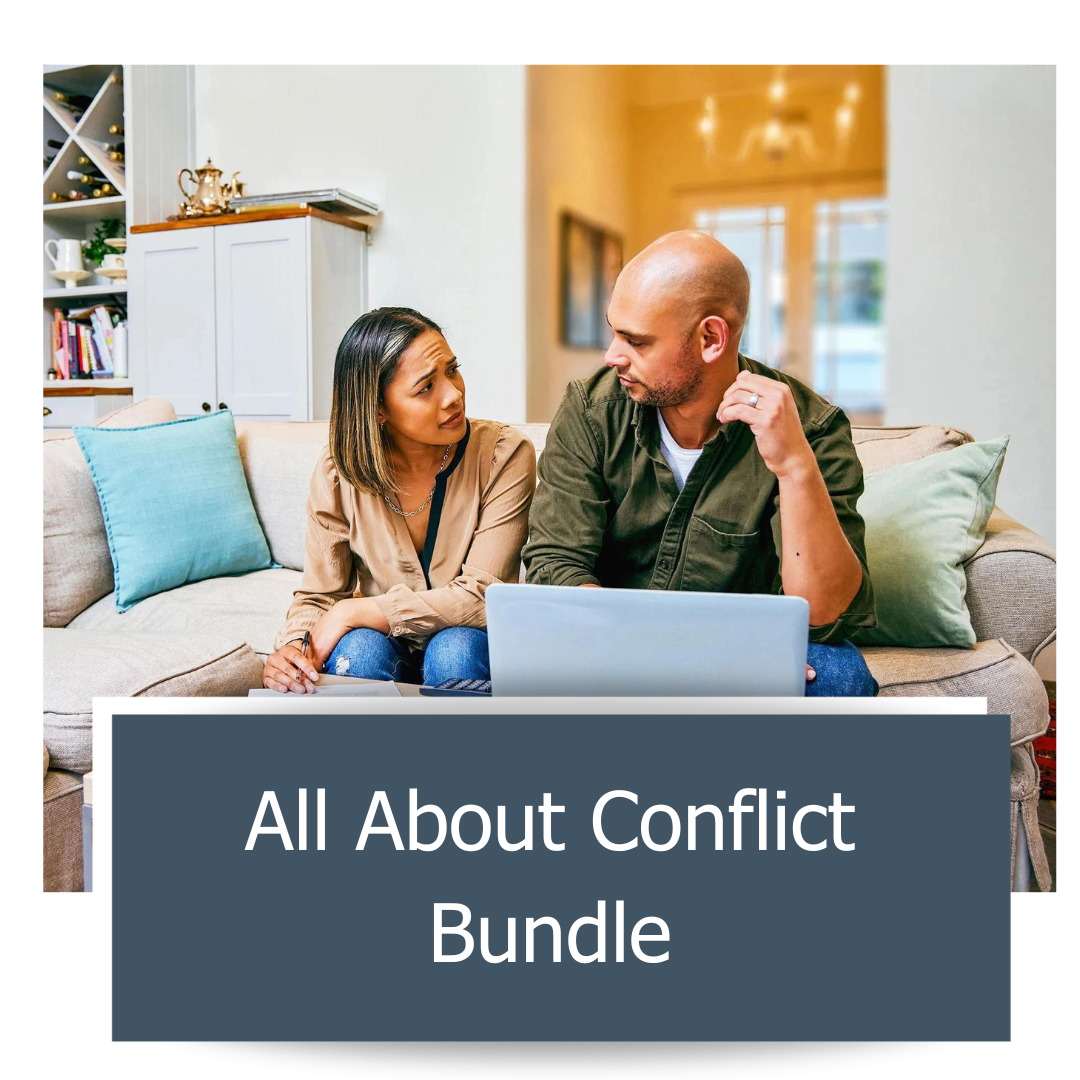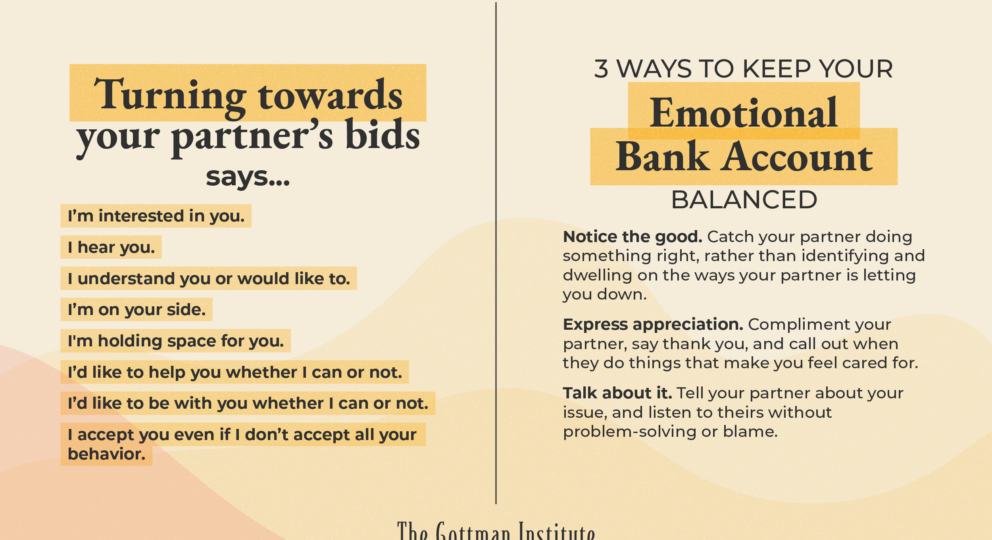Understanding your partner requires the capacity to listen. Really listen. Couples are advised to hear each other’s complaints without feeling attacked, and as great as this sounds, it’s often unrealistic.
When something you said (or didn’t say) hurts your partner’s feelings, there’s a strong impulse to interrupt with, “That wasn’t my intention. You’re misunderstanding me,” even before your partner is done talking.
Unfortunately, when the listener reacts to what the speaker is saying before the speaker gets the chance to fully explain themselves, both partners are left feeling misunderstood.
This is why the “N” in Dr. Gottman’s ATTUNE model stands for Non-defensive listening.
The defensive reaction
For most of us, listening without getting defensive is a hard skill to master. This is especially true when our partner is talking about a trigger of ours. A trigger is an issue that is sensitive to our heart—typically something from our childhood or a previous relationship.
While the phrase “What doesn’t kill you makes you stronger” may have some truth, it doesn’t acknowledge the fact that trauma and regrettable incidents can leave us with scars.
This could be a result of a number of things. Maybe you’ve been repeatedly hurt or you experienced injustice in your relationships. These moments from our past can escalate interactions in the present.
Maybe you feel controlled like Braden does.
When his wife, Suzanne, tells him, “You have to make sure the kids have dinner cooked before you go to the gym,” he responds with, “Stop acting like my mother!”
After a few more defensive statements, Braden shuts down.
Braden’s heart races at the thought of Suzanne bringing up a complaint during their State of the Union meeting. Any complaint she expresses that includes a wish for him to change some part of his schedule around, he feels controlled.
8 science-based tips to improving your communication skills in your relationship.
1. Self-soothe to listen
While it’s important for the speaker to complain without blame and state a positive need to prevent the listener from flooding or responding defensively, it’s also vital for the listener to learn to self-soothe.
If you’re unable to self-soothe, your emotional brain will overpower your rational brain, the part that is designed to self-regulate and communicate, and you’ll “flip your lid” and say or do things you don’t mean.
As Dr. David Schnarch puts it, “Emotionally committed relationships respond better when each partner controls, confronts, soothes, and mobilizes himself/herself.” This is because the more partners can regulate their own emotions, the more stable the relationship becomes.
Self-soothing improves the stability of your relationship by allowing you to maintain yourself and your connection with your partner during a tough conversation.
Here is how Braden did it.
During their State of the Union Meeting, Suzanne started off as the speaker, protecting his triggers by stating her complaint without trying to control him. “When I asked about making sure the kids were taken care of and you responded by telling me I was acting like your mother,” he says, “I felt hurt because it felt like our kids are not a priority for you. I want to make sure our kids are loved. I need some help.”
While Suzanne is expressing her experience using “I” statements, Braden is having a hard time hearing her.
He wants to defend himself and tell her how she is so bossy and demanding. However, he understands that he isn’t supposed to mention any of these feelings until it’s his turn to be the speaker. And when that happens, he has to be sensitive to her triggers.
Below are some tools that helped Braden self-soothe during his State of the Union meeting.
2. Write down what your partner says and any defensiveness you’re feeling
Dr. Gottman suggests using a notepad to write down everything your partner says, which is especially helpful when you’re feeling defensive. This also helps you remember what was said when you reflect back what you hear or it’s your turn to speak. Remind yourself that you’re listening to your partner because you care about their pain. Lastly, it’s helpful to say to yourself, I’ll get my turn to talk and express my feelings about this.
3. Be mindful of love and respect
During tough conversations it’s helpful to focus on your affection and respect for your partner. Recall fond memories and remember the ways your partner has demonstrated their love. Think about how they support you and make you laugh. Consider how the joy you bring each other is more important than this conflict and working through this together will lead to more of those.
I’ve found it helpful to write a quote or a happy memory in the top right corner of my notepad reminding me that I love my partner and that this conflict has the potential to bring us closer. In “What Makes Love Last?,” Dr. Gottman suggests saying to yourself, In this relationship, we do not ignore one another’s pain. I have to understand this hurt. When you self-soothe, you learn to separate your relationship from the anger and hurt you’re feeling over this particular issue.
4. Slow down and breathe
Slowing down and taking deep breaths is a great way to self-soothe. Focus on relaxing your body. Sometimes doodling helps. When you do this, don’t get lost in the activity or stop listening. If your partner notices you soothing, just say, “I am trying to stay present as I listen, and stuff is coming up for me so I am trying to calm myself so I can truly hear you.” Remember to postpone your agenda and focus on understanding your partner.
5. Hold on to yourself
Dr. Schnarch advises partners to create a strong relationship with themselves as individuals by learning how to self-soothe and embrace their own emotions. Oftentimes when you feel flooded, it is not because you are reacting to your partner’s words or behavior. It’s because you are interpreting what they are saying and assigning personal meaning to their statements. Maybe their anger makes you feel like they’re going to leave you. Or maybe it makes you feel like you’re not being a good enough partner.
Look inward and see what you are telling yourself about what this conflict means and how it may impact you. Holding onto yourself also means considering that your partner’s complaint may have truth to it. Sometimes we hold onto a distorted self-portrait. I know I have.
6. Don’t take your partner’s complaint personally
This sounds impossible, especially if the complaint is about something you did or didn’t do. If you feel yourself getting defensive, seek to understand why. Ask yourself, Why am I getting defensive? What am I trying to protect? Your partner’s complaint is about their needs, not yours, so soothe your defensiveness so you can be there for them.
7. Ask for a reframe
If your partner is saying something that is triggering, ask them to say it in a different way. I’m feeling defensive by what you’re saying. Can you please reword your complaint so I can understand your need and explore ways we can meet it?
8. Push the pause button
If you notice you’re having trouble focusing as the listener, ask your partner to take a break from the conversation. This is a proactive way to self-soothe and prevents your emotional brain from flipping its lid. You can say, I’m trying to listen but I’m starting to take things personally. Can we take a break and restart this in 20 minutes? Your feelings are important to me and I want to make sure I understand you. During this time, focus on the positives of your relationship and do something that is productive. I prefer to go for a walk.
Once you’ve learned to self-soothe, it becomes a lot easier to ask your partner to help you calm down. If you find yourself struggling, tell your partner what’s on your mind. For example, “Hun, I’m feeling flooded. Can you tell me how much you love me? I need it right now.” vs. “You’re the one with the problems. Fix yourself!” The latter reaction comes from a place of fear and often creates a self-fulfilling prophecy. The former gives your relationship a fighting chance and the possibility to create a more secure bond.
Conflict is not only a catalyst for understanding, it’s also a vehicle for personal growth. I like to think of relationship conflict like an oyster. Oysters don’t intend to make beautiful pearls. Instead, pearls are a byproduct of the oyster reducing irritation created by grains of sand. In the same way, conflict can inadvertently create connection and closeness.
After listening to Suzanne, Braden takes a deep breath and says, “I hear you saying that my reaction to your request for help with the kids made you feel like family doesn’t matter to me. I can see why you’d be so upset with me.” A tear rolls down Suzanne’s cheek. This is a major breakthrough for their marriage.
Long-lasting love requires courage. The courage to be vulnerable and to listen non-defensively, even in the heat of conflict. Especially when we are hurt and angry.










